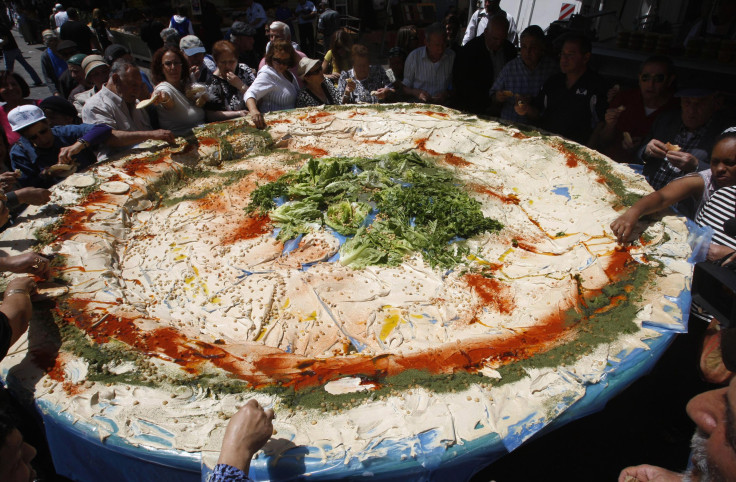International Hummus Day: Israeli Entrepreneur's Middle Eastern Food Celebration Is Still Political For Some

When Israeli-American tech entrepreneur Ben Lang came up with the idea for International Hummus Day, he modeled the celebration of the popular Middle Eastern chickpea dish on another popular food holiday: World Nutella Day. But Lang saw in hummus something the Italian hazelnut-chocolate spread did not have: a special potential in helping to change perceptions about Israel around the world.
“The idea was to connect people around hummus and get more people talking about it and hopefully get people to see the good things that are happening in Israel,” Lang said. “I just wanted to make sure that people saw that the initiative started in Israel.”
Now in its fourth year, the food celebration is more popular than ever, with more than 84,000 Facebook users from around the world indicating they would be participating Wednesday in the holiday’s objective of eating hummus, “the more, the better.” According to Lang, part of the appeal of the occasion is its potential for fostering unity through a dish that's widely loved in a region otherwise divided on most subjects. “It's a Middle Eastern food, but we can all share it,” he argued.
Despite this mission, hummus, a food staple in countries across the Middle East that has become increasingly popular in the United States thanks to the rise of Israeli-owned hummus brands, has also come to symbolize some of the deeper political and cultural tensions at the heart of the longstanding conflict between Israel and the Palestinians over borders and identity. As a result, the idea of hummus as a vehicle for greater understanding in the Middle East is problematic for some, who argue that such efforts fundamentally ignore these deeper issues.
“In principle it would be wonderful to say ‘Make hummus, not war,’” said Laila El-Haddad, a Palestinian activist based in the U.S. and co-author of "The Gaza Kitchen." “But that just implies an acceptance of the underlying inequalities and political context... It’s akin to a group of white people in Baltimore saying, 'Let's just sit down over a plate of collards and talk about this and just get along.'”
The subject of hummus has increasingly become a flashpoint in Middle East debates as the famous Israeli appetite and enthusiasm for the chickpea dish has come up against Arab sensitivities about cultural appropriation. In particular, the claim of hummus as a “traditional Israeli dish" has rankled not just Palestinians but also Israel’s Arab neighbors, many of whom similarly lay claim to hummus as an integral part of their traditional cuisine.
In 2008, the Association of Lebanese Industrialists threatened to sue Israel in an international court to prevent Israeli companies from claiming what is said were its traditional dishes as their own. The president of the organization accused Israel of “stealing” the dish at the cost of millions of dollars in trade for Lebanon. This rivalry has played out in more recent years in competitions over which country could set a world record for producing the largest single dish of hummus, a title Lebanon most recently won with a 23,000-pound (10,000 kg) vat of the delicacy.
In the United States, Israeli companies are the unquestionable winner when it comes to dominating the market for hummus, which is becoming more popular than ever among Americans. The food trend-tracking group Baum and Whiteman called hummus one of the hottest food trends for Americans in 2015, in a report that found that hummus could even rival mayonnaise in popularity. Sales of the food were up to $800 million in 2012, from just $16 million in 2006. Two Israeli companies dominate the market, with the Sabra brand accounting for a 63 percent share, while competitor Tribe has around 7 percent.
The dominance of Israeli companies in the U.S. hummus market is frustrating for some Palestinian-Americans, including Tina Matar, a senior at the University of California Riverside, who said it gave a false impression that hummus is an exclusively Israeli dish. “When I speak to my American friends, I always try to make sure they understand that what they’re eating is not only from Israel, it originated in Arab culture.”
But, more importantly for Matar, the president of the university’s chapter of Students for Justice in Palestine, is the connection companies like Sabra have to funding Israel’s military and its actions in occupied Palestinian territories. Sabra has been the target of a boycott campaign by pro-Palestinian activists who have organized against its parent company, Strauss, for providing support to the Israeli army’s Golani Brigade, which allegedly committed human-rights abuses in the West Bank and Gaza.
The allegations have also been taken up by activist groups at schools like UCR and Wesleyan that have attempted to remove the brand from shelves on their campuses. “It's been a very effective tool,” Matar said. “We have students from all corners of campus coming up to ask us about the campaign.”
Amid the highly politicized context surrounding discussions of hummus, Lang maintains that International Hummus Day should remain an apolitical affair, dedicated solely to the appreciation of the dish. “Obviously some people will look at this negatively, but I don't want that to be the focus of the day,” he said. “The goal is to have people celebrate hummus and to get people to eat hummus.”
© Copyright IBTimes 2024. All rights reserved.






















